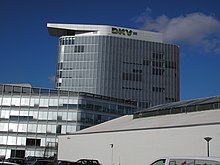DKV German health insurance
| DKV Deutsche Krankenversicherung Aktiengesellschaft
|
|
|---|---|
| legal form | Corporation |
| founding | January 11, 1927 |
| Seat |
Cologne , Germany |
| management | Clemens Muth ( CEO ) |
| Number of employees | no own (2016) |
| sales | 4.727 billion euros (contributions 2016) |
| Branch | Private health insurance |
| Website | www.dkv.com |
| As of December 31, 2016 | |
The DKV German health insurance corporation is a German provider of private health insurance companies headquartered in Cologne . The company was founded on January 11, 1927 in Berlin and is one of the largest private health insurers in Germany and one of the largest in Europe. DKV has been part of the ERGO Group since 1998 .
history
The four doctors Olga Philip, Leopold Baer, Erich Heimann, Felix A. Theilhaber and the businessman Max Fabisch gave the impetus to found the DKV in Berlin . The entry in the commercial register on January 11, 1927 was made under the name Deutsche Kranken-Versicherungs-Aktien-Gesellschaft zu Berlin . The share capital was 2 million Reichsmarks . The start with 15 employees was accompanied by Paul Wittke, a key figure in the Berlin insurance industry. Initially, rented business premises in Berlin-Mitte, Potsdamer Str. 75, were used. In 1929 the shareholders of DKV acquired the majority of the shares in Brandenburger Lebensversicherung-A.-G. Just two years after it was founded, 300 employees moved into their own property in Berlin-Schöneberg, Innsbrucker Str. 26-27, in 1930. In 1932 the company was taken over by Hamburg-Mannheimer Versicherungs-Aktien-Gesellschaft. The chairman of the board was taken over by Hermann Hitzler, who also headed the Hamburg-Mannheimer.
Due to the bombing and destruction of the head office in 1943, the administrative tasks had to be taken over decentrally by the branches. In 1952 a friendship contract was signed with Allianz insurance. When the further development of the company made it necessary to build a new building, the board of directors decided in 1954 not to build this building in Berlin, but in the Rhenish insurance metropolis of Cologne, which was central to the branches in the business area at the time. The Berlin business premises on Innsbrucker Strasse were retained, but from then on Cologne was the headquarters. After the ruins of the former Hohenstaufenbad were acquired by the City of Cologne in 1958, construction planning began at the end of 1958. From the beginning of 1961, the building at Hohenstaufenring 62 was gradually put into operation with a capacity for around 1,100 employees.
Due to the sharp increase in the number of insured persons, more and more employees were needed. Shortly after moving into the new administration building, additional office space had to be rented. Therefore, in 1965, planning began for another new building, which was completed in 1969. The move of the head office from Hohenstaufenring to the new building at Aachener Strasse 300 in Cologne-Braunsfeld was completed in 1970. At that time, DKV's market share in private health insurance was over 20%.
In the 1960s and 1970s, the ownership structure changed several times and there was an ever closer integration between the companies DKV and Hamburg-Mannheimer on the one hand and Allianz and Munich Re (now Munich Re) on the other. Many board members were represented on the supervisory boards of the other companies, which was common practice at that time and generally known as Deutschland AG . In 1978 the logo and the official spelling was changed from Deutsche Kranken-Versicherungs-AG to Deutsche Krankenversicherung AG . It was not until 1997/98 that Victoria, Hamburg-Mannheimer, DKV and DAS merged to form the ERGO insurance group, which was almost 95% owned by Munich Re, and the gradual unbundling from Allianz.
Despite an extension to the main building and the construction of a new office building in Scheidtweilerstraße, which was in the immediate vicinity of the main administration, office space again became scarce in the 1990s. After tough negotiations, several properties were acquired in Scheidtweilerstraße and another office complex was built, which the company moved into from 2005. The two office buildings are connected by a tunnel under the street.
In 2010, as part of the restructuring of the ERGO insurance group, the health insurance business of Victoria Krankenversicherung was taken over by DKV, which again made it possible to achieve market leadership.
| CEO | |
|---|---|
|
DKV
|
|
subsidiary company
The main subsidiaries of DKV are: DKV-Residences, goDentis and goMedus.
swell
- Experience creates the future - brochure 75 years of DKV
- DKV annual reports 2009 to 2012
Individual evidence
- ↑ a b Annual report on the 2016 annual financial statements of DKV Deutsche Krankenversicherung Aktiengesellschaft. ( [1] ).
- ↑ Subsidiary . DKV website, accessed on January 6, 2017.


